Power Overview and QA
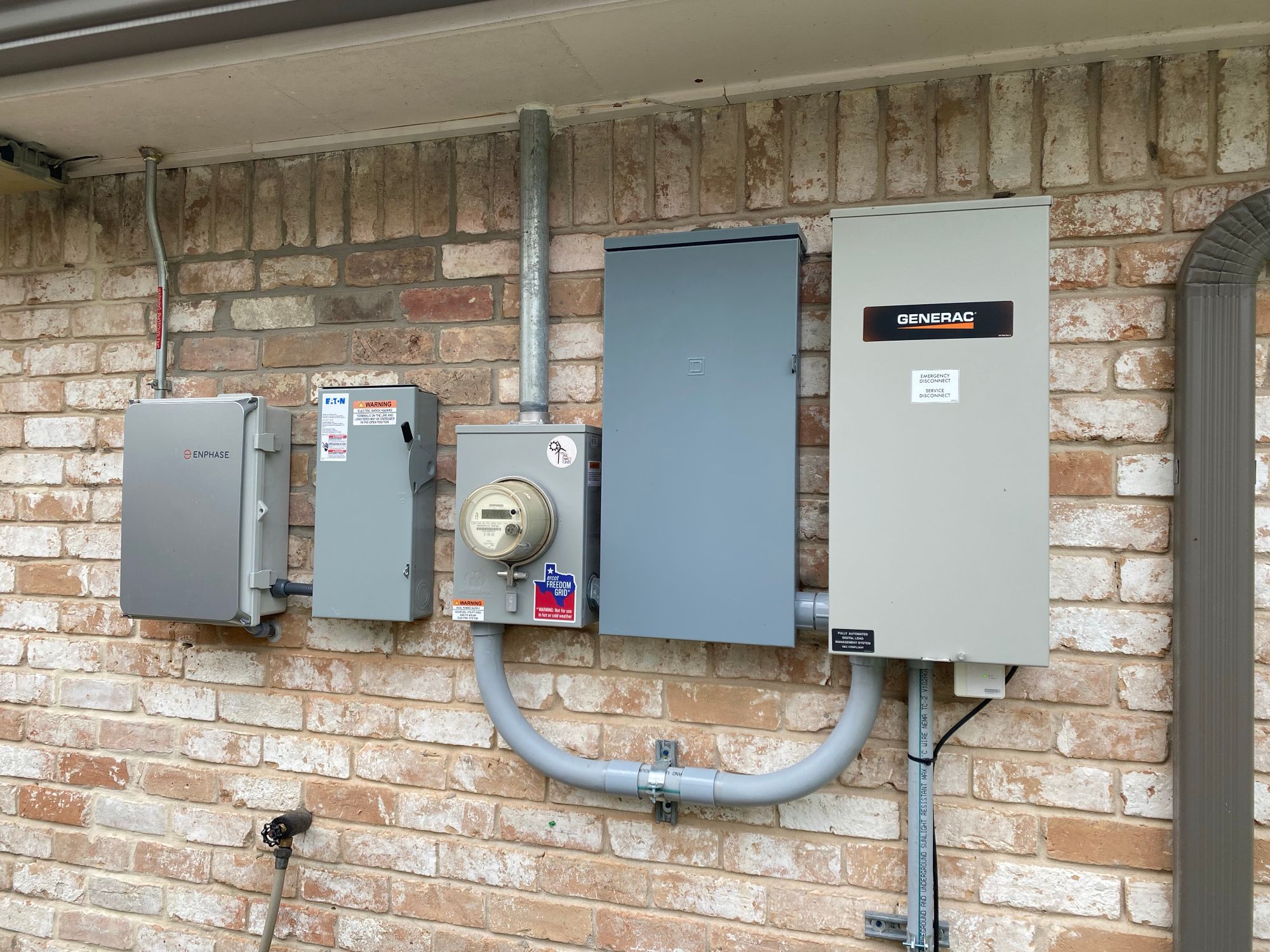
Since posting about my Solar, Portable Generator and Generac Generator, I've had a lot of questions. So here is a full overview of the entire setup as a whole, and a list of questions that were asked.
First, let's start with the diagram, because people like diagrams.
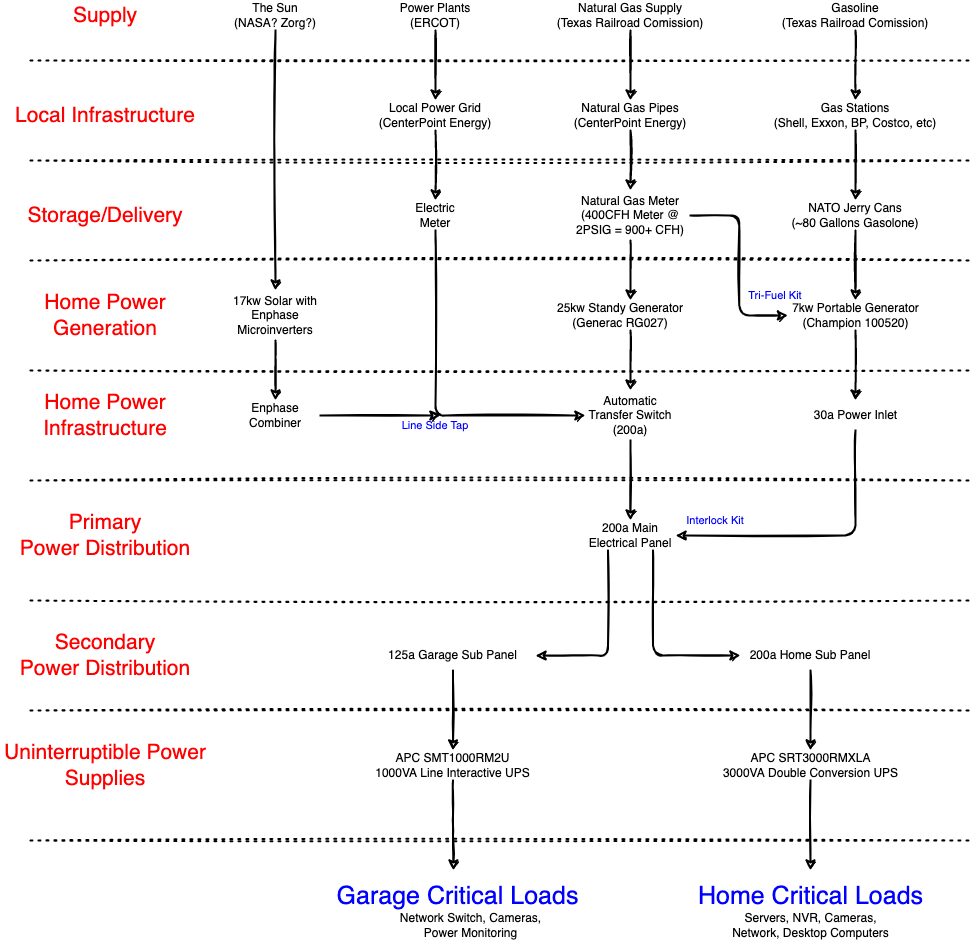
That pretty much sums it up. Better than I could write it.
Here are some situations
- Brief (Under 10 second Outage): Power goes off, but the UPS's keep all important devices running without interruption.
- Longer Outage: It takes the generator 10 seconds to switch power. Then I'm running on generator for as long as needed
- Generac Fails: I roll my portable generator out, hook it up to natural gas and power it up
- Natural Gas Goes Out: I roll my portable generator out and power it on. I have over a weeks worth of gasoline.
Here are the posts that explain this setup


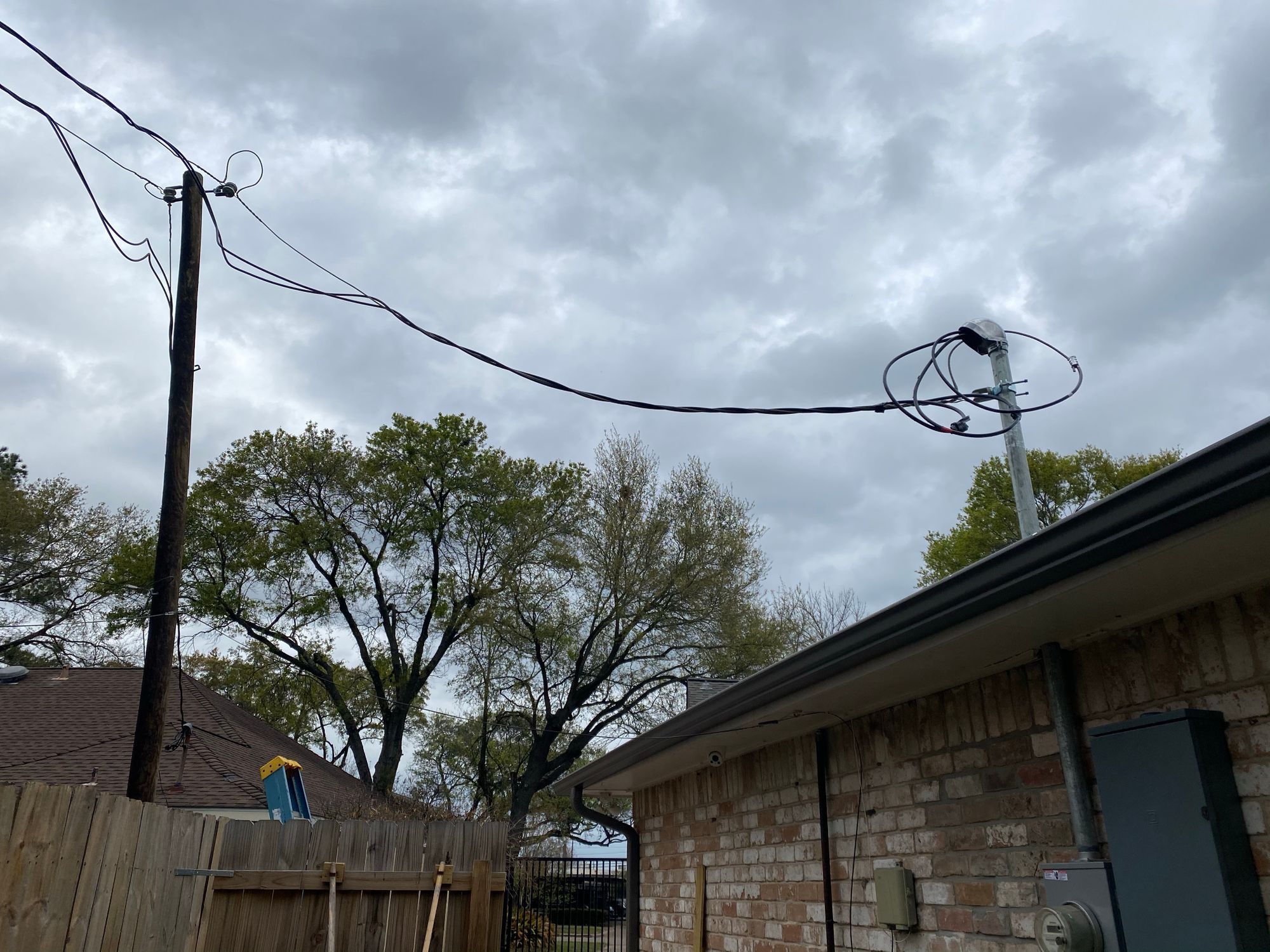

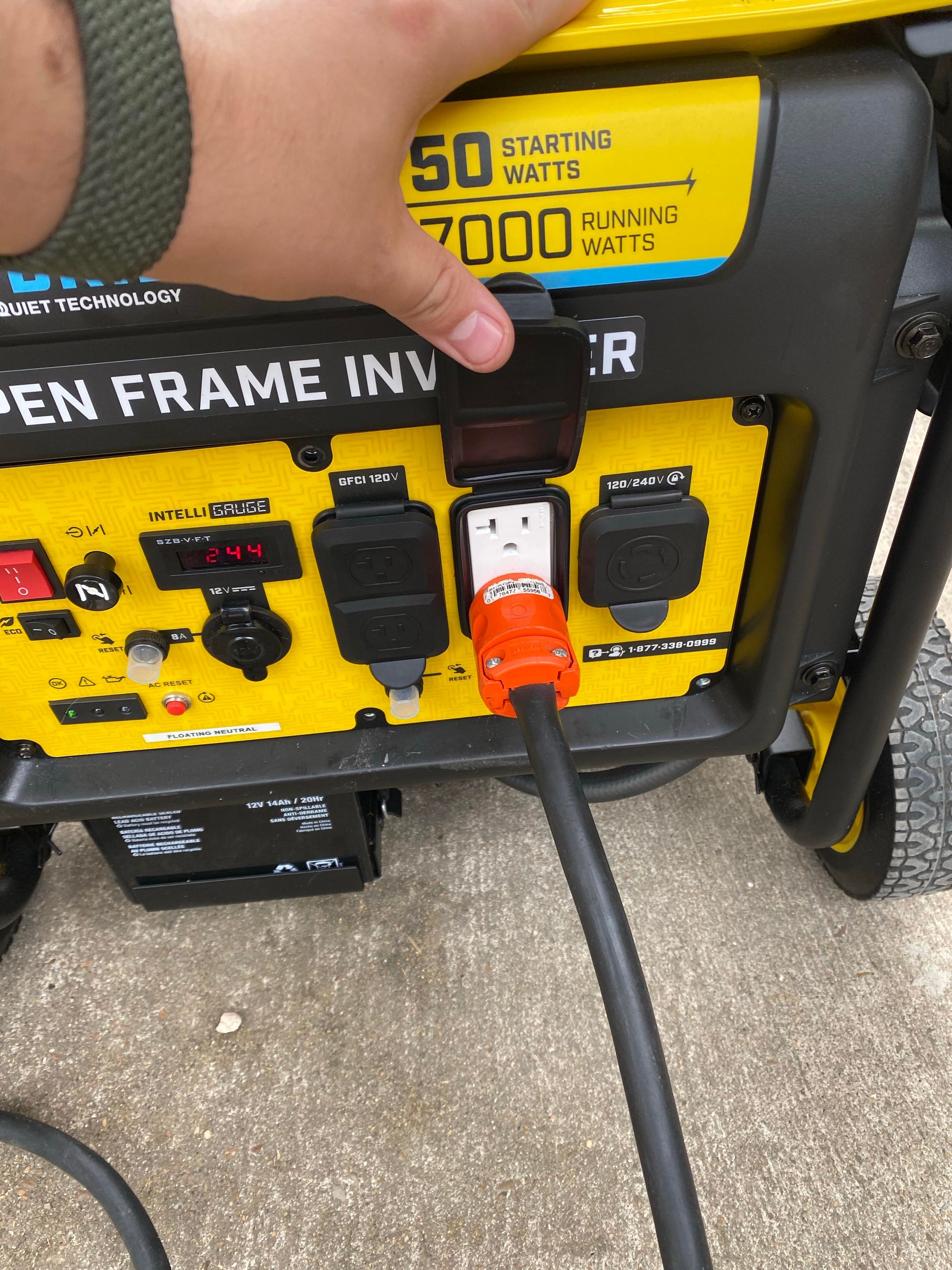
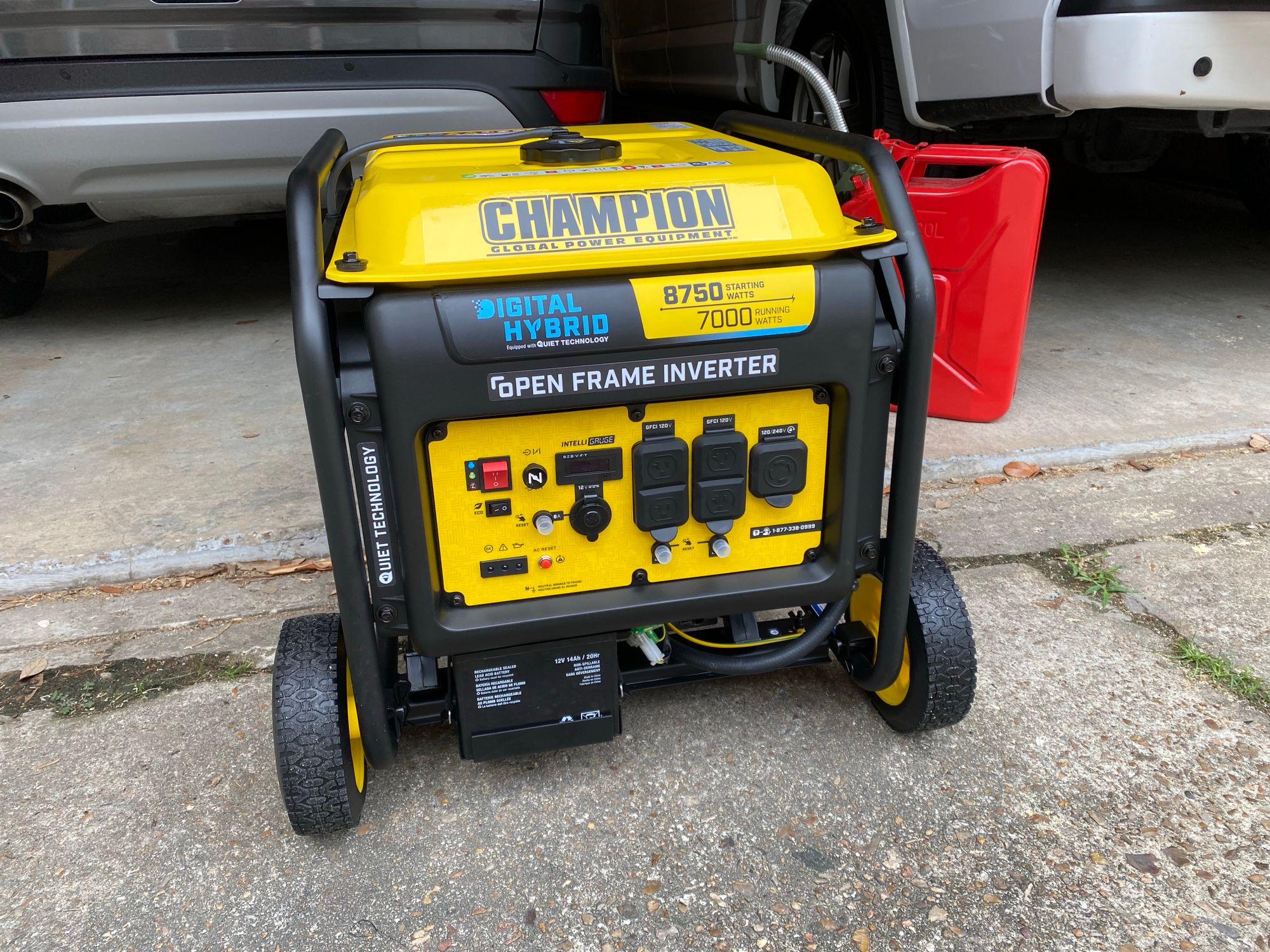
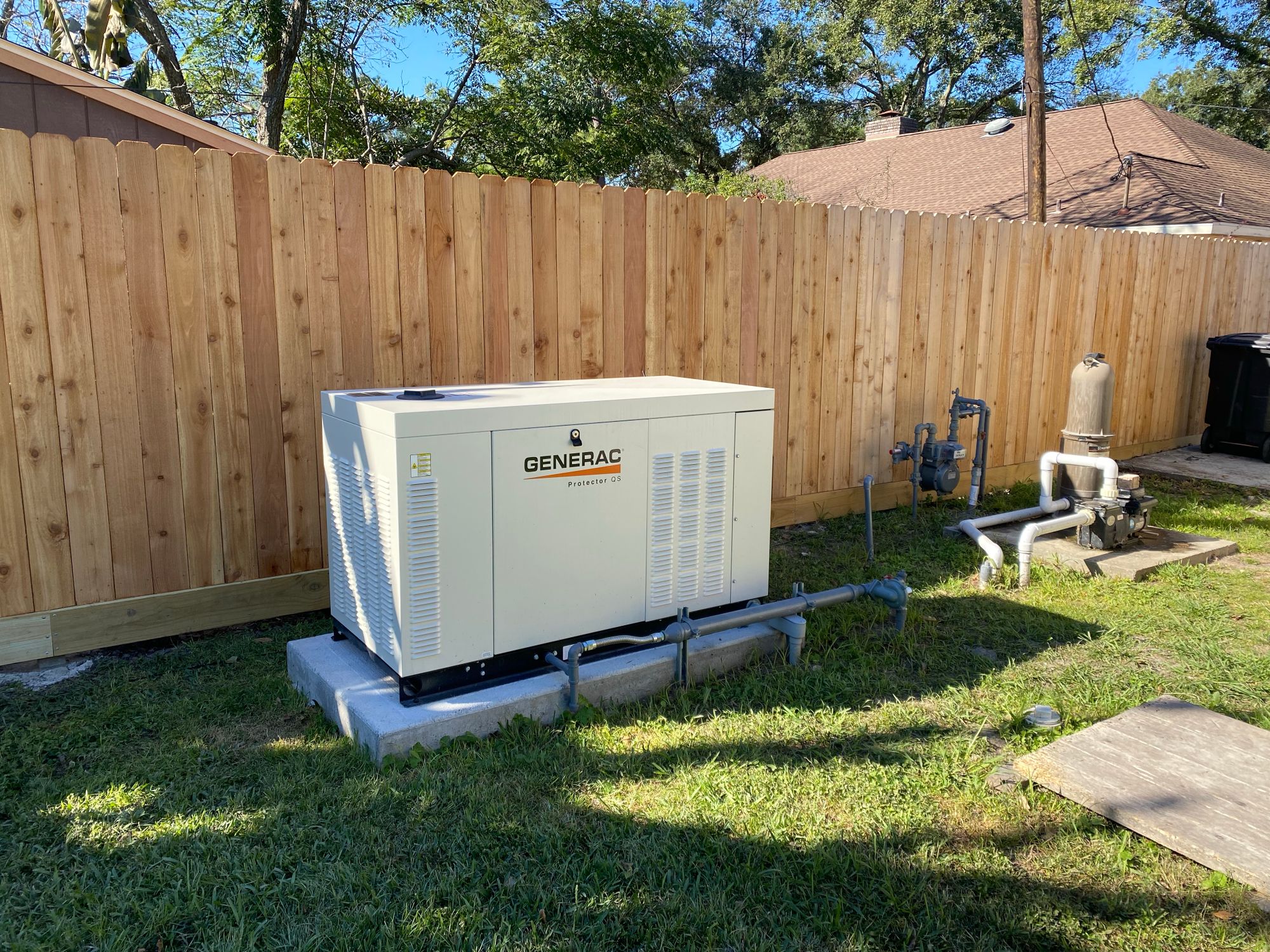

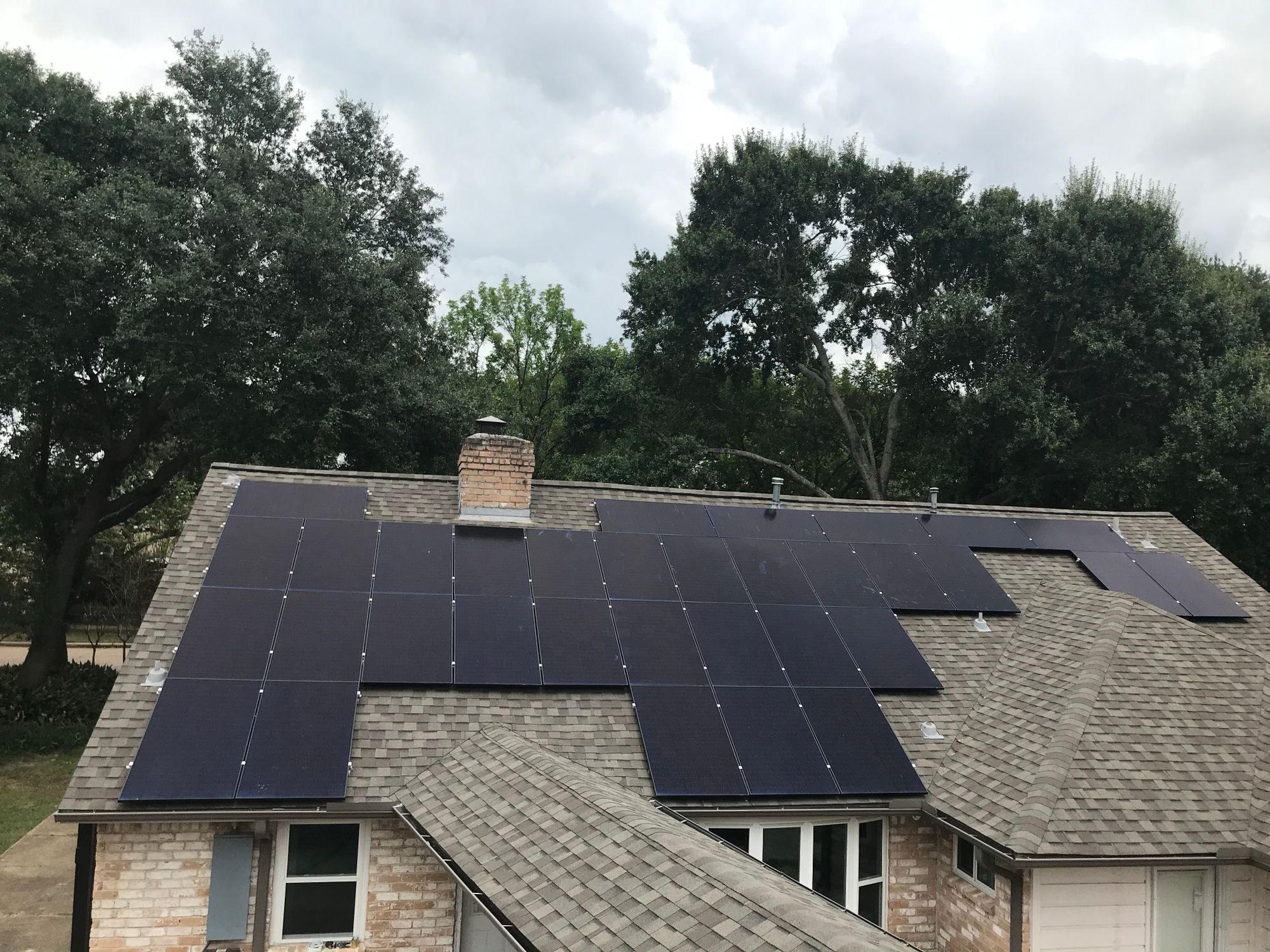
That should explain everything to a good degree. Let's look at the questions that were asked
What Prompted you to do this?
I've always wanted a generator, a portable generator and solar. But when "The Freeze" hit Texas I lost power for a while, and knew it was time. Me and my wife also work from home, so having power and internet is a necessity.
Why does the power go out so frequently?
It really doesn't go out that often, all of this may imply the power goes out all the time, but it doesn't. We do however have above ground power lines, so high wind and falling trees can easily take out the power. I live near the gulf of Mexico, so I am in the path of a lot of hurricanes. That paired with bad management of the grid and neglected local power lines, and you need to get yourself a generator.
Why not batteries?
Batteries for my climate and how much power I use just don't make sense right now as a backup power source. For a small house with not much HVAC, it could work.
I looked at my solar production on the worst days, and looked at the temperature. There was a hot, humid day where it was full cloud all day long. I produced just 9kwh that day, my lowest ever! And then I used almost 40kwh between "Sun hours". This means that even if it was full sun the day before and after, I'd need at least $30,000 in batteries. But then with all the clouds, there is no way I could charge them up during the day. So all that money, and I have to watch my power usage like a hawk. Why? When I can spend less, and get a generator that will run 24/7
The other issues is that batteries wear out no matter what. You have 10-15 years of use, and they are done. With a generator, it should last forever as long as you maintain it. And if it breaks, you can easily fix it
I will say that if net metering ends, I will look into batteries. And if a system that comes along that properly integrates with a generator, I would be interested. Currently the Enphase system does apparently, but it limits the generator down to 12kw, which is a shame.
Why not just a large portable generator?
Portable generators are not designed to run 24/7 and they have much lower outputs. I bought the generator for a situation where there might not be power for a full week during a hurricane, for that you want the right tool for the job.
Why bother with the portable generator when you have the Generac?
I bought the portable generator before I had the Generac. But the main reason was that in the extremely unlikely event the natural gas goes out, or the Generac fails, I have a backup.
How long does it take for the Generac to start?
It takes 10 seconds for the generator to start and switch power output to generator. So all I need to deal with is 10 seconds of no power.
How long does it take to get the portable generator up and running?
Under 2 minutes. Its fueled with gasoline and has the natural gas hose attached. All I need to do is roll it out the garage, start it, and plug it in. Easy.
How much does it cost to run the Generac on natural gas?
At the load it will typically have on it from my house, around $15/day. This may seem expensive, but if you had a full 7 day power outage, would you pay $100 in Natural Gas to have power? I would. This is at current NG prices, that could go up or down
At 25% load, it works out at 12c/kwh which is not bad at all, here is my rough math is someone wants to fact check it

Is the solar a good financial decision?
For me, yes. Personally I'm not too concerned about the financial sense of it, I just wanted solar panels so I could avoid paying the utility, and be ready for batteries when they become a good deal. This also means I am omitting less CO2, so its win-win.
The power from solar even including the cost of the panels works out much cheaper per month than paying for electric. The amount electric "costs" varies per month, as the more I over generate, the more credit I get.
Because I'm generally producing more than I'm using, and its 1:1 net metering, I am shielded from electric price increases. If they double the price of energy, it doesn't matter to me. In fact, I would just get even more credit back.
There is currently a 26% Federal Tax Credit for 2021 and 2022, and then it drops down to 22% in 2023, and unless renewed, it ends in 2024. So if you are getting solar panels, do it ASAP so you can get this tax credit.
Also keep in mind that its a tax CREDIT. So if you have low income and only pay $2000 in tax per year for example, and you get a $15,000 tax credit, it would take you over 7 years to claim it back on your taxes. With the current end of the credit coming, you would lose out on most of the credit when it ends, which would mean you're paying more for your solar panels. So if you're poor, your solar panels cost more.
Why not a propane generator?
Because I live in the city where Natural Gas is available, propane isn't popular. I could probably get a large tank installed for the generator, but it would be a hassle to get refilled and it wouldn't last long. You burn through that propane awfully quick. I'd be lucky to get a weeks worth of runtime even on a large tank. It would however make sense for the portable generator. However since nothing else I have runs on propane, it doesn't make much sense for me.
Why not a Diesel generator?
The main reason is that I don't have a Diesel truck. If I did, it might make more sense as I could rotate it out. But another big issue is that my base load is really only 2-3kw most of the time. This would cause wet stacking in the generator unless I made sure to bump up the load at the end of each run. That would then require some kind of load bank etc.
Why doesn't your solar make power when the grid goes down?
The solar is tied to the grid, and when the grid goes down the solar is required to have rapid shutdown so that it does not injure lineman working on power lines. Once off, it has nothing to sync with to make power. To have power when the grid is down, you need something that is grid forming like a battery. Newer Enphase inverters that have not yet been released at the time of making this post are able to grid form themselves and give you power when the grid is down, but it requires extra equipment, and I'm not about to go swap 45 microinverters.
Is the portable generator one that you recommend I purchase?
Probably not. If you are just looking for an EMERGENCY backup, it might work for you. Its cheap, its easy to work on, its popular enough that aftermarket parts are available. But its very loud. If you don't mind the noise, then it could be a good option.
The better option would be the PREDATOR 9500 from Harbor Freight if you can find one in stock. In my option this is the best bang for the buck portable generator to power your house.

This should be much quieter and has better output. The downside being that its double the price.
Is the Generac Generator what you would recommend?
Maybe. What I would suggest is that whatever you get, its 1800RPM and liquid cooled. They are just much better generators.
If you get a liquid cooled from Generac, Cummins, Kohler etc I'm sure they will be good. I think Kohler is the best brand of these, however they don't have a 25kw model for natural gas. Their 24kw model only does 20kw on NG. The next step is a 30kw model. Personally I feel like 20kw is a little small for the money you are spending, and then 30kw is pretty big and more complex (It has a turbo)
So for me, I think this was probably the best choice. The reason I discounted Cummins is that the rep I got a quote from never really sat well with me, and they have a very poor warranty. Just 2 years/400 hours. The Generac has a 5 Year/2000 hours
So for me, I think this was the best choice.
How loud is the Generac?
Not loud at all. Think of a car at high idle. The noise is also mostly fan noise which is a much "Nicer" sound than a horrible exhaust on an air cooled generator
How loud is the Portable Generator?
Very loud. If you get it, I'd suggest you build some kind of generator shed for it if you have neighbors. If you let it throttle down with the eco switch its not too bad however.
Why do you have a 27kw generator?
Because the 27kw actually only does 25kw on NG. The next step down on the generator is the 22kw, which does 20kw on natural gas. The 22kw is just $500 cheaper than hte 27kw. So I got the 27
What happens if the natural gas goes out?
If the Natural Gas goes out I will lose the ability to use the Generac generator, my hot water heater, my furnace and my dryer. In that event I would turn on the portable gasoline generator and run from that until it comes back on. I also have some mini split heat pumps that can provide heat.
Apart from brief very local outages for instances where a pipe was hit for example, I can't find any outages in this area for the past 40+ years. We don't get earthquakes here, so Natural Gas is very reliable.
Did the natural gas go out during the Texas freeze?
I cannot find a SINGLE source showing the natural gas went out to residential properties during the freeze. All of the outages were of large supply lines to power plants. If someone has an actual source verifying an outage, I'd love to see it. I think a lot of people THINK their gas went out, when in reality they didn't know their appliances required power to operate as well.
How big is your gas tank?
The big Generac generator is natural gas, so there is no tank like you would have with propane. Its plumbed directly into the natural gas supply. For the portable generator, I have around 80 gallons of stored gasoline, and the generator itself has a 4.2 gallon tank.
Is it dangerous to store that amount of gasoline in your garage?
No. Because I have them stored in genuine Wavian NATO gas cans that are completely sealed, there is no risk of gasoline vapor in the garage. They can even be completely engulfed in flames and not rupture.
Why not user a GenerLink instead of the manual interlock?
I've had a few people ask me why I have not used the GenerLink product instead of my interlock. I can't see many upsides to the product, so here are my concerns
- its $650. That is enough for me right there to skip it. The interlock + inlet was less than $200 total.
- What does it get me that I don't already have? Nothing
- It bamboozles my solar. Right now if I wanted to, I could run on generator while still running solar and feeding the grid.
- Modifying that requires the utility to come out and I can't mess with it myself
If it fails catastrophically, I lose ALL POWER as the meter feeds right into it. The interlock kit can't do that - It pushes the meter out further, and that means more chance for rain to hit it. Even if its weatherproof, the less water on it, the better,
- Its putting more stress from the cord hanging directly on the meter can
- It requires a proprietary cable... why?
I just don't get it. If you have one and you are happy, great. But I don't see the reasoning for it.
What is your testing setup for the Portable Generator?
Every 6 months I do a 30 minute to an hour run while powering the house. I do this on Gasoline one day, and Natural Gas another day. This just ensured I can power everything I want to power on it. I like most people get new stuff every now and then, so I want to make sure it all works with the generator.
I do plan to build a load bank soon, so I will add a test to run it at 100% capacity then as well.
What is your testing setup for the Generac?
It does a 12 Minute exercise each week, but that is completely unloaded. So every month I switch input to the generator and run the house for at least 30 minutes. This makes sure the ATS works and it can actually supply power. It also gets it nice and heated up to burn off any moisture that may have accumulated in the oil.
Why do this when the government should just do their job?
I got this question a lot, but I don't really get it. Yeah, I'd love for the power to stay on 100% of the time, but even with a perfectly maintained grid and a perfect government, it won't. We live in an area that gets frequent large hurricanes, so its nearly impossible to always keep the lights on.
Why is your 1800RPM Liquid cooled generator better than my air cooled generator?
My 25kw Generator has a 4 cylinder 2.4l Automotive engine thats liquid cooled like your car. It runs at 1800rpm
The air cooled Generators run at 3600rpm with a 2 cylinder 999c custom made engine, and rely on the ambient air to cool the generator.
The 3600rpm generators use more fuel, they are louder, and have 4x the amount of mechanical friction than an 1800rpm unit.
The 1800rpm models are more expensive, but they will last much longer, run longer and parts are easy to come by because they are just car engines.

